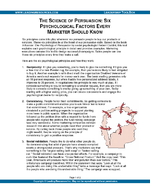
Categories
The Science of Persuasion - Six Psychological Factors Every Marketer Should Know
$9.95
In stock
The Science of Persuasion - Six Psychological Factors Every Marketer Should Know
Product Details
Six principles of marketing psychology come into play whenever we persuade people to buy our products or services. These six principles lie at the heart of our persuasive skills. Based on the book Influence: The Psychology of Persuasion by social psychologist Robert Cialdini, this tool explains each psychological principle in detail and provides examples. Marketing executives can use this tool to design successful campaigns. Sales people can use these six principles every time they make a call. (2 pages)
Join the LRI Newsletter to receive free tools and expertise to improve your business.
Six Principles of Marketing Psychology
Here are the six principles of marketing psychology and how they work:
1. Reciprocity: If I give you something, you’re likely to give me something. If I give you a free trial of a new Persian rug, for example, then you’re more likely to feel obligated to buy it. Another example is with direct mail: the organization Disabled Veterans of America sends out requests for money each year. The basic mailing generates only an 18 percent response, but when it adds free personalized address labels, it improves to 35 percent. In negotiations this principle is very much at play. If I concede something to you by retreating to a smaller request, then you are more likely to concede something to me by giving up something of your own. So by starting with a higher asking price, you can create concessions and engage the psychological desire for reciprocity.
2. Consistency
Purchase to download the rest of this tool.
